The construction industry has witnessed a remarkable transformation with the integration of GPS trackers. These powerful devices play a pivotal role in managing construction operations, ensuring asset security, and promoting safety. In this article, we explore how GPS trackers for construction are revolutionizing the construction landscape and how they contribute to the success of construction businesses.
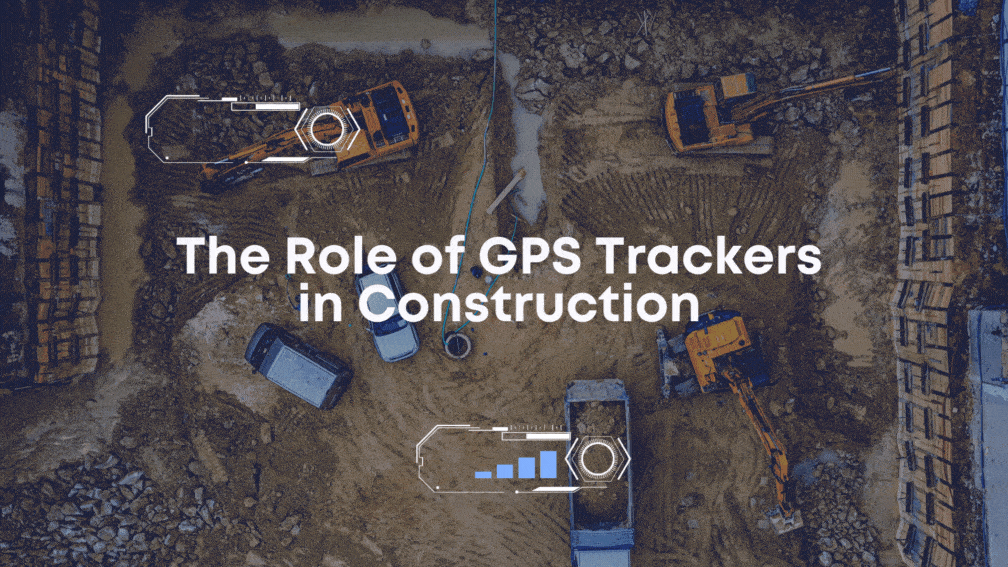

Skyhawk, a robust fleet management software, offers essential services:
In conclusion, GPS trackers are indispensable tools for construction companies. By leveraging technology like Skyhawk, businesses can enhance efficiency, safety, and overall project success.
The "last mile," or the last portion of a product's trip to the client, may make or break a company's image in the complicated world of supply chain management. Recognizing the importance of last-mile fleet management is essential for any business looking to improve the agility of its supply chain. The deployment of a fleet management system is a crucial step in this procedure.
Last-mile fleet management is the process of efficiently coordinating and overseeing the final leg of product delivery, ensuring that goods reach their intended destination, be it a retail store or a customer's doorstep. This stage is essential because it represents the last touchpoint between a business and its customers, leaving a lasting impression that can greatly influence customer satisfaction and loyalty.

The last mile presents a unique set of challenges in supply chain management:
Time Sensitivity: Last-mile deliveries often involve tight schedules and delivery windows. Delayed deliveries can lead to customer dissatisfaction.
Route Optimization: Identifying the most efficient routes for multiple deliveries is complex, and inefficient routes can lead to increased costs and time consumption.
Traffic and Congestion: Urban areas are frequently plagued by traffic congestion, making it difficult to meet delivery deadlines.
Data Accuracy: Accurate tracking and data collection are essential, as any errors can lead to miscommunication and delays.
Customer Expectations: Today's consumers expect real-time tracking and transparency, putting pressure on businesses to meet these demands.

Efficient last-mile fleet management, driven by a robust tracking system, offers a multitude of advantages:
Enhanced Customer Satisfaction with our Arrival/Departure: Real-time tracking allows customers to monitor their deliveries, reducing anxiety and improving their overall experience.
Reduced Delivery Costs with Skyhawk's Route and Task: Route optimization and data-driven decision-making help cut down operational expenses.
Improved Delivery Accuracy with Real-time Location Tracking: Tracking systems reduce the risk of errors and ensure that packages reach the right destination.
Faster Order Fulfillment: Speedy and precise deliveries help businesses meet customers' demands for quick service.
Real-Time Visibility with Skyhawk's Fleet Management: Tracking systems provide businesses with the necessary real-time data to monitor and manage their last-mile operations effectively.
By optimizing routes and reducing idle time, businesses can minimize their environmental impact, contributing to a greener and more sustainable future.
In essence, last-mile fleet management, powered by a robust tracking system, has become a linchpin in ensuring the efficiency and precision of the final leg of the supply chain journey. It not only helps businesses meet their customers' expectations but also significantly improves operational efficiency and cost-effectiveness. Embracing this technology-driven approach is an investment in a brighter and more agile supply chain future.
Fleet management solutions ( like Skyhawk's Fleet Management ) are software applications that help businesses manage their vehicles, drivers, and operations. They can provide various benefits, such as reducing costs, improving efficiency, enhancing safety, and complying with regulations. But do they really work? How can you measure the effectiveness of fleet management solutions? In this blog post, we will explore some of the ways to evaluate the performance of fleet management solutions and how they can help your business achieve its goals.
One of the main objectives of fleet management solutions is to reduce costs. This can be done by optimizing fuel consumption, minimizing maintenance expenses, avoiding fines and penalties and lowering vehicle wear and tear. To measure the cost savings of fleet management solutions, you can compare the total cost of ownership (TCO) of your fleet before and after implementing the software. TCO is a comprehensive metric that includes all the direct and indirect costs associated with owning and operating a vehicle, such as depreciation, fuel, repairs, taxes, fees, insurance, etc. By tracking the TCO of your fleet over time, you can see how much money you are saving by using fleet management solutions.
Another goal of fleet management solutions is to improve efficiency. This means getting more done with less resources, such as time, labor, and equipment. Fleet management solutions can help you optimize your routes, schedules, dispatching, and delivery processes. They can also help you monitor your fleet's performance, such as speed, mileage, idle time, location, etc. To measure the efficiency gains of fleet management solutions, you can use key performance indicators (KPIs) that reflect your business objectives. For example, some common KPIs for fleet efficiency are:
By tracking these KPIs before and after implementing fleet management solutions, you can see how much your efficiency has improved.
A third benefit of fleet management solutions is to enhance safety. This means reducing the risk of accidents, injuries, and damages that can harm your drivers, vehicles, customers, and reputation. Fleet management solutions can help you enforce safe driving behaviors, such as obeying speed limits, avoiding harsh braking and acceleration, wearing seat belts, etc. They can also help you prevent breakdowns and malfunctions by alerting you to potential issues and scheduling preventive maintenance. To measure the safety improvements of fleet management solutions, you can use metrics such as:
By tracking these metrics before and after implementing fleet management solutions, you can see how much your safety has improved.
A final advantage of fleet management solutions is to comply with regulations. This means following the rules and standards that govern your industry and operations. Fleet management solutions can help you comply with various regulations, such as:
By using fleet management solutions to comply with these regulations, you can avoid fines, penalties, audits, and lawsuits.
As you can see, fleet management solutions work by providing various benefits for your business. They can help you reduce costs, improve efficiency, enhance safety, and comply with regulations. However, not all fleet management solutions are created equal. You need to choose a solution that suits your needs, budget, and goals. To find the best solution for your business, you should consider factors such as:
By comparing different options based on these factors, you can select a solution that works for you.
Fleet management solutions are powerful tools that can help you manage your vehicles, drivers, and operations. They can provide you with cost savings, efficiency gains, safety enhancements, and compliance benefits. However, you need to choose a solution that works for you. By evaluating the performance and suitability of different solutions, you can find the best one for your business.
In the world of logistics and delivery services, one of the greatest challenges is the efficient allocation and direction of tasks and routes to drivers. Skyhawk Route & Tasks is a revolutionary tool designed to ensure that process is not only efficient but also easy to execute. Our best route optimization software is available on multiple operating systems including Android, iOS, Windows, and Mac, making it accessible to virtually everyone.
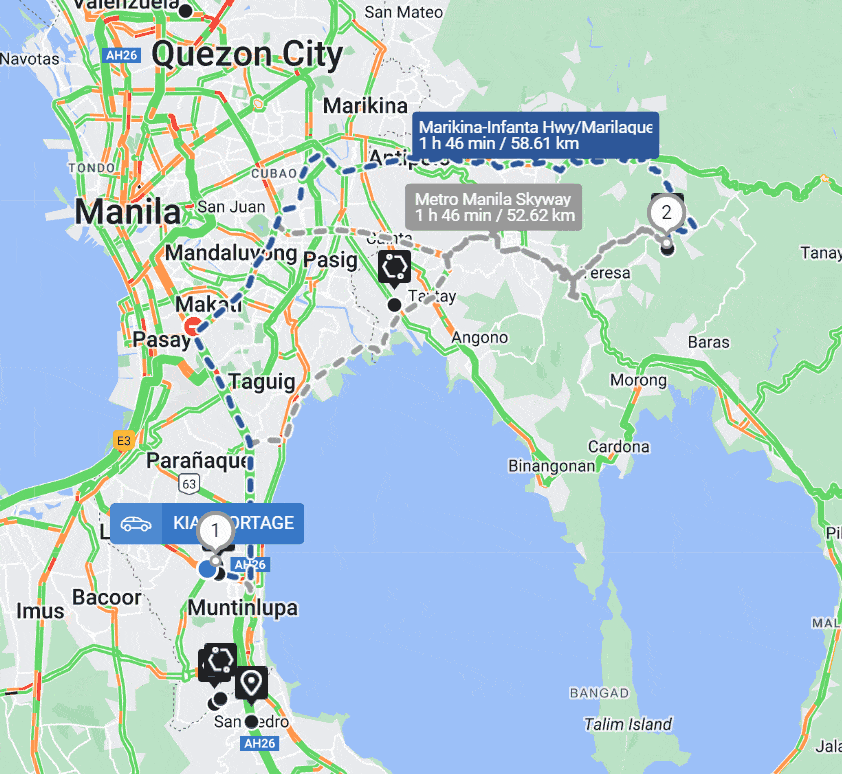
The primary feature of Skyhawk Route & Tasks is its ability to automatically optimize routes. Our best route optimization software uses complex algorithms and real-time data to calculate the most efficient routes for your drivers. This not only saves time but also reduces costs associated with fuel and vehicle maintenance. Additionally, the software considers various factors such as traffic conditions, road works, and other potential obstacles, ensuring that your drivers are always on the most efficient path to their destination.
Moreover, the automatic optimization feature is a great tool for businesses that have multiple deliveries in different locations. Skyhawk Fleet Management intelligently organizes the tasks in a way that minimizes the distance covered and the time spent on the road. This feature is particularly useful for businesses such as courier services, food delivery, and other logistics companies.
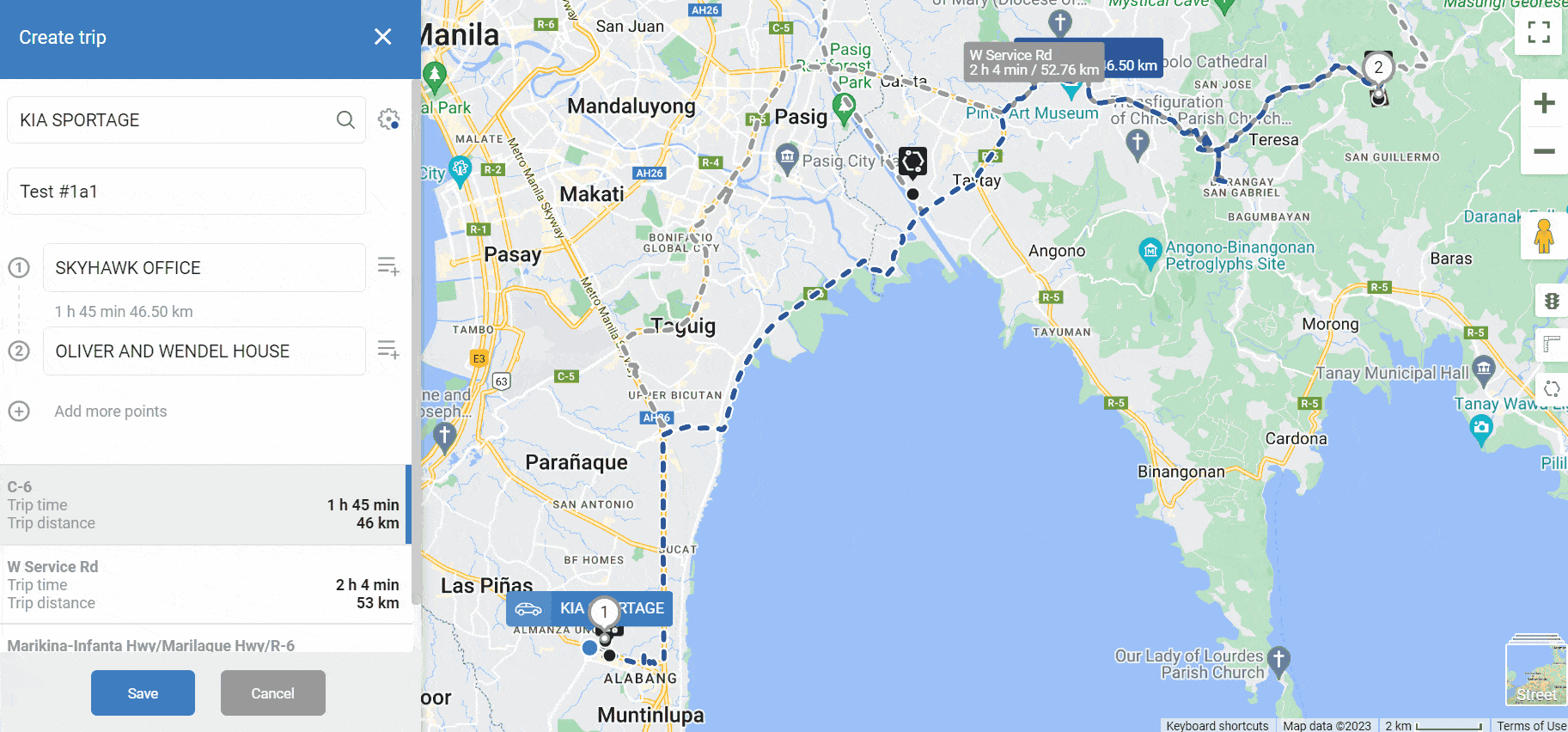
Despite its advanced features, The best route optimization module Skyhawk Route & Tasks is incredibly easy to use. The user-friendly interface is designed with simplicity in mind, making it possible for anyone to quickly learn how to use the software. Whether you're tech-savvy or a complete novice, you'll find it easy to navigate through the software and take full advantage of its features.
Additionally, Skyhawk Fleet Management includes a comprehensive help section with detailed instructions and tutorials. This means that even if you encounter a problem or are unsure about how to perform a certain task, help is always just a click away.
Another great advantage of Skyhawk Route & Tasks is its wide range of compatibility. The software is available on Android, iOS, Windows, and Mac operating systems. This means that it can be accessed from various devices, including smartphones, tablets, and computers. This flexibility allows you to manage your routes and tasks from anywhere, at any time, making it a valuable tool for businesses of all sizes.
So, if you're in the logistics or delivery industry and you're looking for a way to improve efficiency and reduce costs, Skyhawk Route & Tasks could be the solution you've been waiting for the best route optimization. With its automatic route optimization, easy-to-use interface, and wide range of compatibility, it's more than just a software - it's a game-changer.
Fuel monitoring is a critical aspect of efficient fleet management. By leveraging GPS fuel monitoring systems and working with LTFRB-accredited GPS providers.
Businesses can optimize their fleets, reduce costs, and improve operational efficiency. In this blog post, we will delve into the significance of fuel monitoring in fleet management, highlighting the benefits of GPS fuel monitoring and the importance of choosing an LTFRB-accredited GPS provider.
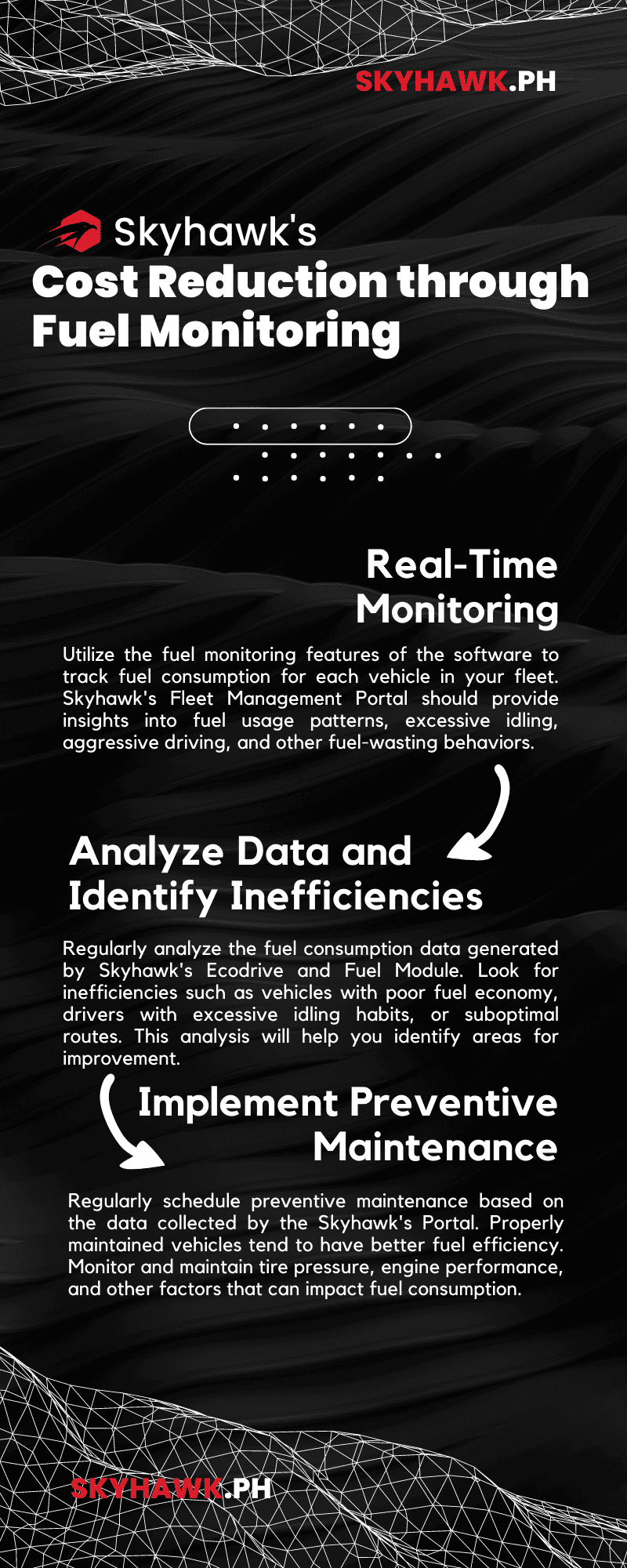
Implementing Skyhawk's fuel monitoring strategies enables businesses to effectively manage their fuel consumption and reduce costs as much as 30%.
GPS fuel monitoring systems provide real-time data, allowing fleet managers to identify inefficiencies, such as excessive idling or inefficient routes. By analyzing this data, managers can optimize routes, reduce idle time, and minimize fuel consumption, resulting in substantial cost savings.
Fuel monitoring plays a pivotal role in improving operational efficiency within fleets.
Real-time data from GPS fuel monitoring systems enables fleet managers to gain insights into driver behavior, such as unauthorized vehicle use (Skyhawk's Driver ID can help you with this) or excessive speeding.
By addressing these issues promptly, fleet managers can enhance driver performance, ensure adherence to company policies, KPIs, and additionally, improve overall operational efficiency.
First thing to remember, Set up your own speeding policies to make sure your trucks are most efficient. combat overspeeding and set up your own customized events and get notified instantly.
A truck driving 75mph consumes 27% more fuel than one driving 65mph
Fuel theft poses a significant challenge for fleet managers, leading to financial losses and operational disruptions.
By integrating anti-fuel theft measures with fuel monitoring systems, businesses can strengthen their security protocols.
These measures include fuel level sensors, and geofencing to detect and prevent unauthorized fuel siphoning or theft. Real-time monitoring and alerts enable swift action, reducing the impact of fuel theft incidents as a result.
In the Philippines, adhering to regulatory requirements set by the Land Transportation Franchising and Regulatory Board (LTFRB) is essential for fleet management.
Opting for an LTFRB-accredited GPS provider ensures compliance, minimizing the risk of penalties and legal complications.
Fuel monitoring is an essential component of successful fleet management. Implementing GPS fuel monitoring systems and choosing an LTFRB-accredited GPS provider can result in cost reduction, enhanced operational efficiency, regulatory compliance, and improved security.
By leveraging fuel monitoring technologies and working with accredited providers, businesses can optimize their fleets, reduce expenses, and operate more efficiently in today's competitive market.
Fleet management is the process of controlling a company's vehicle mobility and operations. This is accomplished with the assistance of vehicle tracking systems, which offer real-time data on the vehicle's position, speed, and direction.
Fleet tracking and management may assist businesses in increasing efficiency by optimizing routes, decreasing fuel consumption, and lowering pollutants. It also aids in lowering maintenance costs by forecasting when components must be replaced.
Fleet visibility is one of the most important aspects of fleet management. It helps companies to keep track of their vehicles and their drivers, reducing fuel consumption and costs while also promoting a safe work environment.
The accuracy and control in vehicle data are two key factors that help with fleet visibility. The accuracy of the data is essential for tracking the location, mileage, usage, and other information about a vehicle. The control is necessary to ensure that everyone has access to accurate data.
What can you do with this data? Driver feedback, on the other hand, encourages them to drive responsibly and safely. Organizations and businesses utilize these data points to design incentives and policies that help them improve and grow their operations.
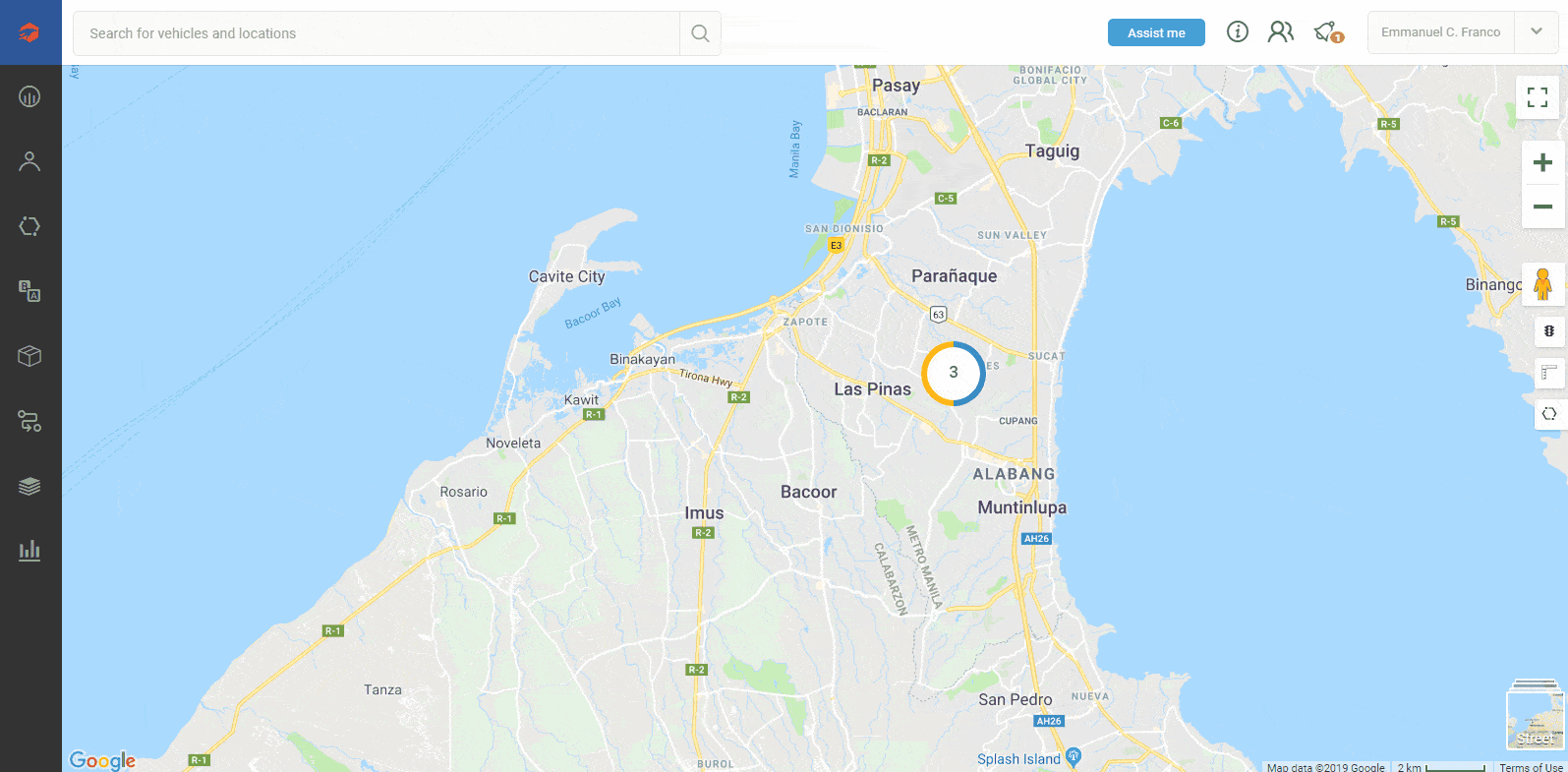
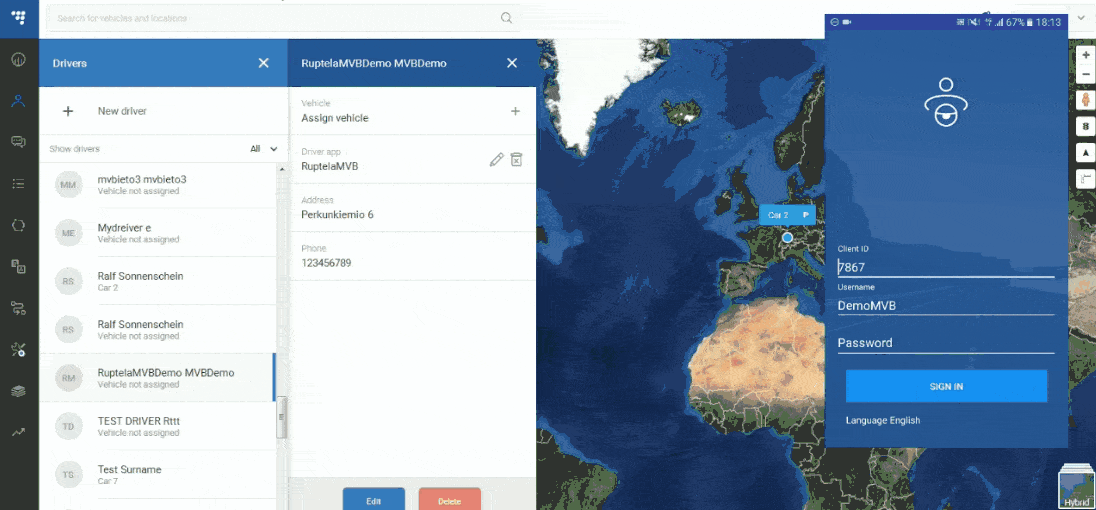
With the help of Fleet Management System(FMS) and it’s automation on various tasks and events, employees can work on tasks on more precise and faster capacity.
Employees can use FMS to automate your maintenance system with our customizable maintenance tasks creator, that will instantly notify you via. email/SMS/in-application in whatever requirement you need.
Having a well-maintained vehicle and strictly monitoring it, not only provides confidence in your driver’s for their safety but also a well-known huge fuel economy improvement.
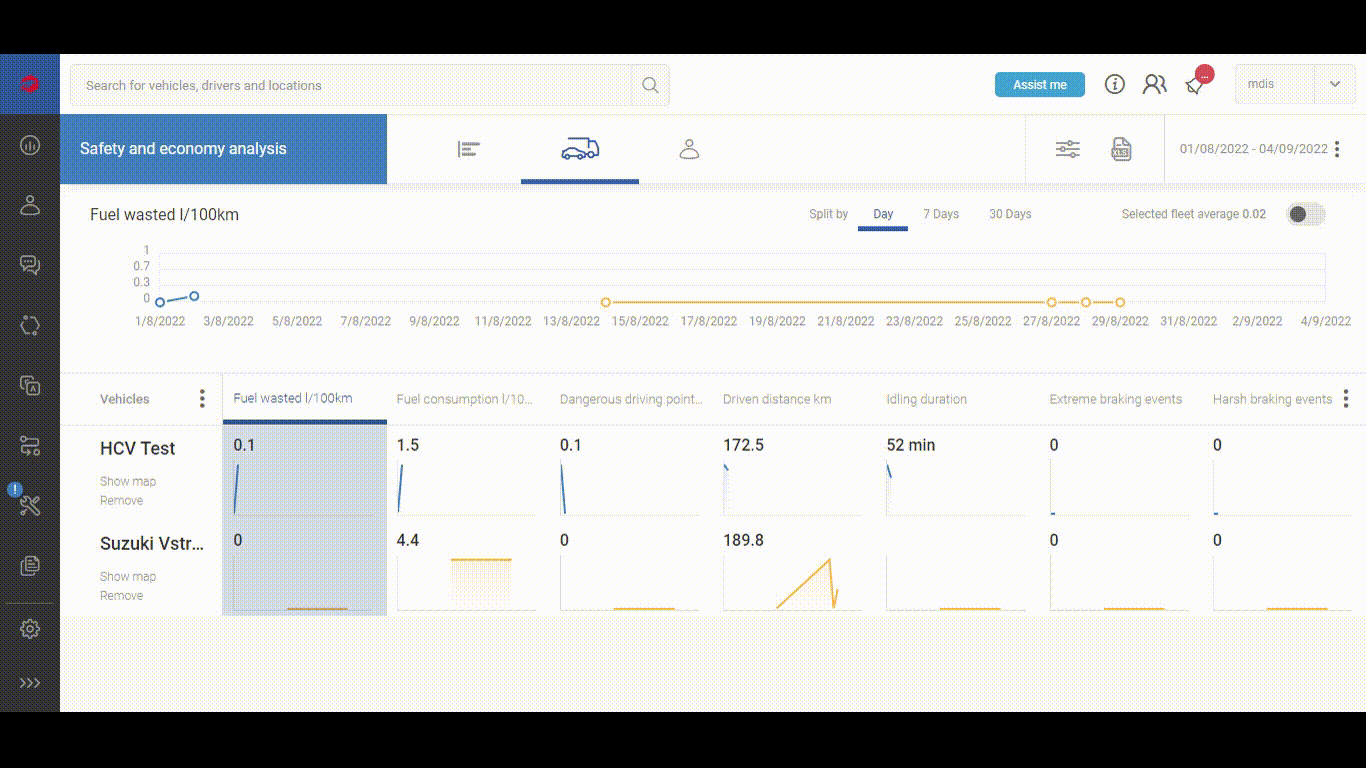
The workforce is growing more mobile. They want to work from their most productive location. This implies that businesses must invest in Fleet Tracking solutions to assist them manage their workers' time and tasks.
This is when task management solutions like the OnTrack Mobile App come in helpful. These technologies enable managers to track the time spent on various routes and jobs. Drivers can be more productive this way since they know exactly what they need to complete and how much time they have till the deadline.
A sustainable fleet management program has several advantages. To begin with, it may help the company's bottom line by lowering expenses and raising profits. It can also help the environment by lowering greenhouse gas emissions and fossil fuel use.
The first stage in developing a sustainable fleet management program is to define the program's goals. These objectives should be consistent with the general mission statement of the organization, as this will assist to guarantee that they are attainable and practical. The next stage is to devise a strategy for achieving these objectives.
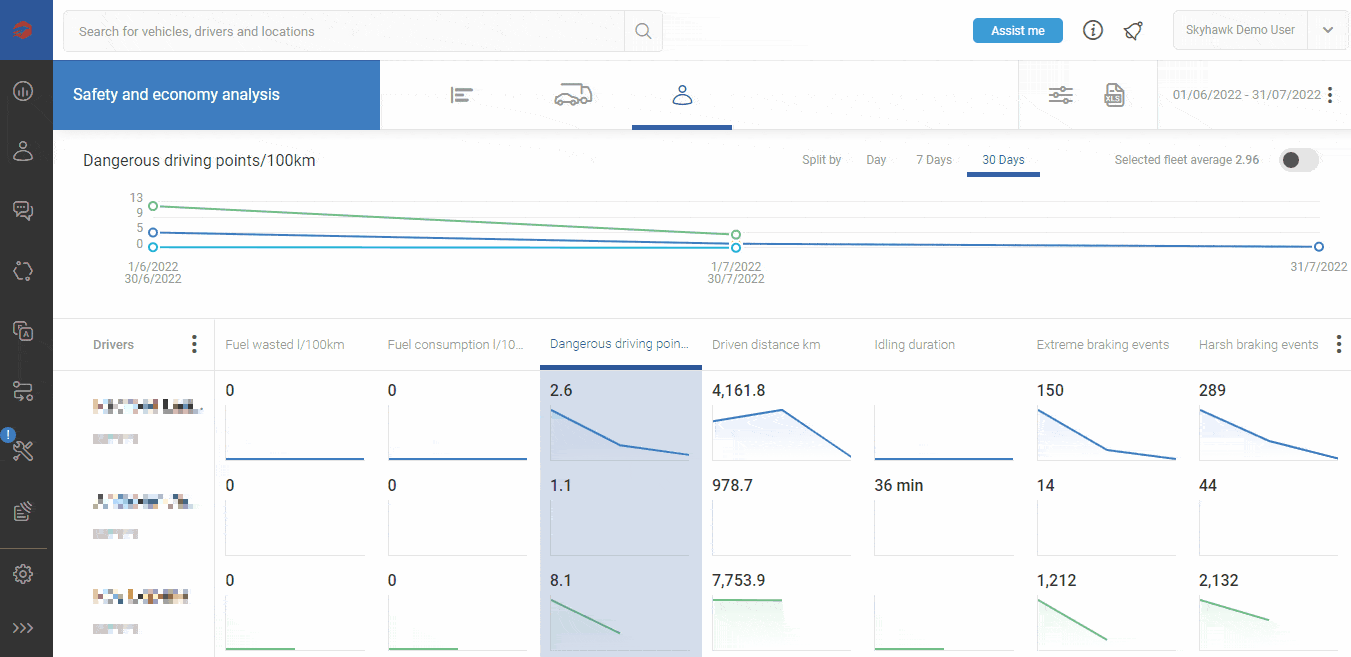
We can let you view real-time data and telemetry using our application to keep you up to date on your business no matter where you are. Accurate reports and reactions are embedded into the program, increasing productivity in all administrative activities, particularly with Skyhawk's fully customized reports.
All reports are acquired using our European-made, high-precision GPS tracking device, which provides real-time telematic data that you can use to implement adjustments and respond to circumstances efficiently and quickly.
Here's more ways for Skyhawk to help your company.
